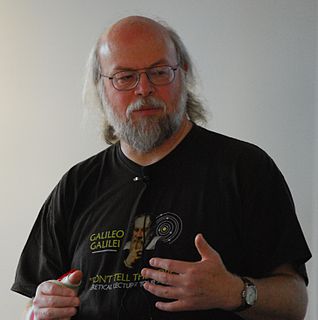A Quote by Edward Snowden
The bare bones tools for a cyber-attack are to identify a vulnerability in the system you want to gain access to or you want to subvert or you want to deny, destroy, or degrade, and then to exploit it, which means to send codes, deliver code to that system somehow and get that code to that vulnerability, to that crack in their wall, jam it in there, and then have it execute.
Related Quotes
Code wants to be simple... I had to give up the idea that I had the perfect vision of the system to which the system had to conform. Instead, I had to accept that I was only the vehicle for the system expressing its own desire for simplicity. My vision could shape initial direction, and my attention to the desires of the code could affect how quickly and how well the system found its desired shape, but the system is riding me much more than I am riding the system.
The security world needs to take a more proactive approach. A lot of companies will know an exploit exists and they'll release the software anyways, and the patch later on. Stuff like this needs to stop. There needs to be some kind of agency that verifies code before it's released, maybe a grading system for code.
The lyrics stand today (1980). They're still my feeling about politics. I want to see the plan. I want to know what you're going to do after you've knocked it all down. I mean, can't we use some of it? What's the point of bombing Wall Street? If you want to change the system, change the system. It's no good shooting people.
Revenge tries to solve the problem of vulnerability. If I strike back, I transfer vulnerability from myself to the other. And yet by striking back I produce a world in which my vulnerability to injury is increased by the likelihood of another strike. So it seems as if I'm getting rid of my vulnerability and instead locating it with the other, but actually I'm heightening the vulnerability of everyone and I'm heightening the possibility of violence that happens between us.
There's a subtle reason that programmers always want to throw away the code and start over. The reason is that they think the old code is a mess. [...] The reason that they think the old code is a mess is because of a cardinal, fundamental law of programming: It's harder to read code than to write it.
A zero-day exploit is a method of hacking a system. It's sort of a vulnerability that has an exploit written for it, sort of a key and a lock that go together to a given software package. It could be an internet web server. It could be Microsoft Office. It could be Adobe Reader or it could be Facebook.
When I launched the development of the GNU system, I explicitly said the purpose of developing this system is so we can use our computers and have freedom, thus if you use some other free system instead but you have freedom, then it's a success. It's not popularity for our code but it's success for our goal.




































